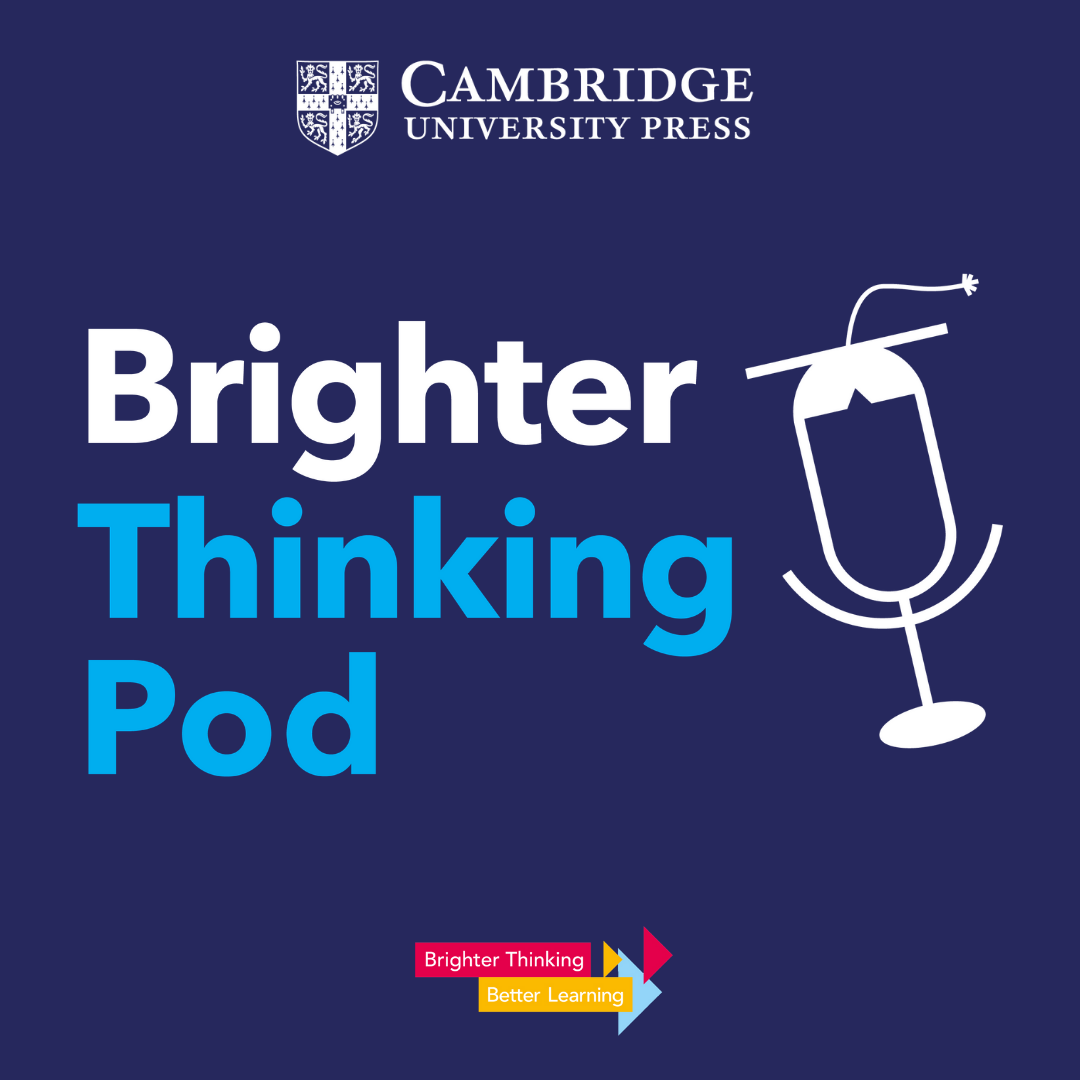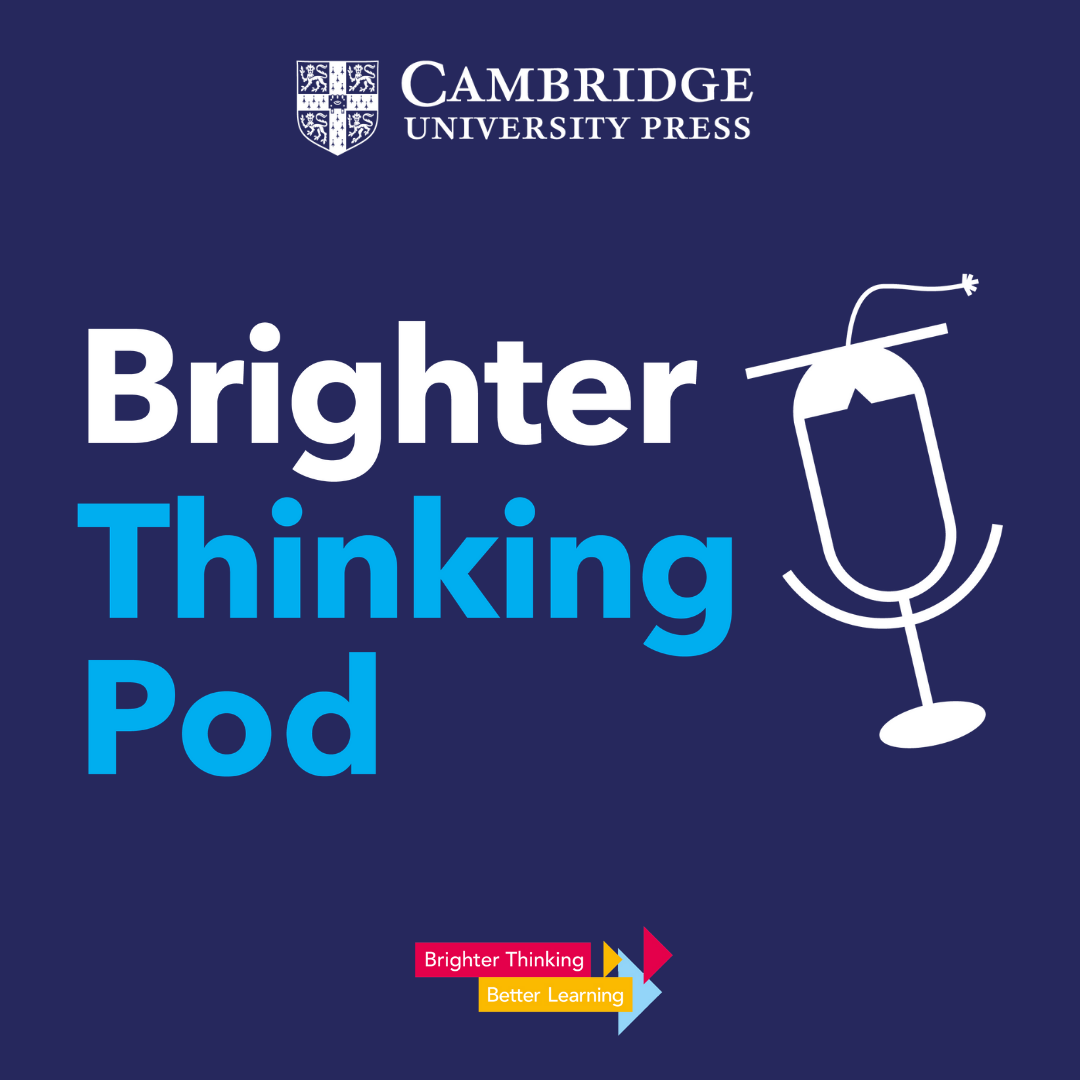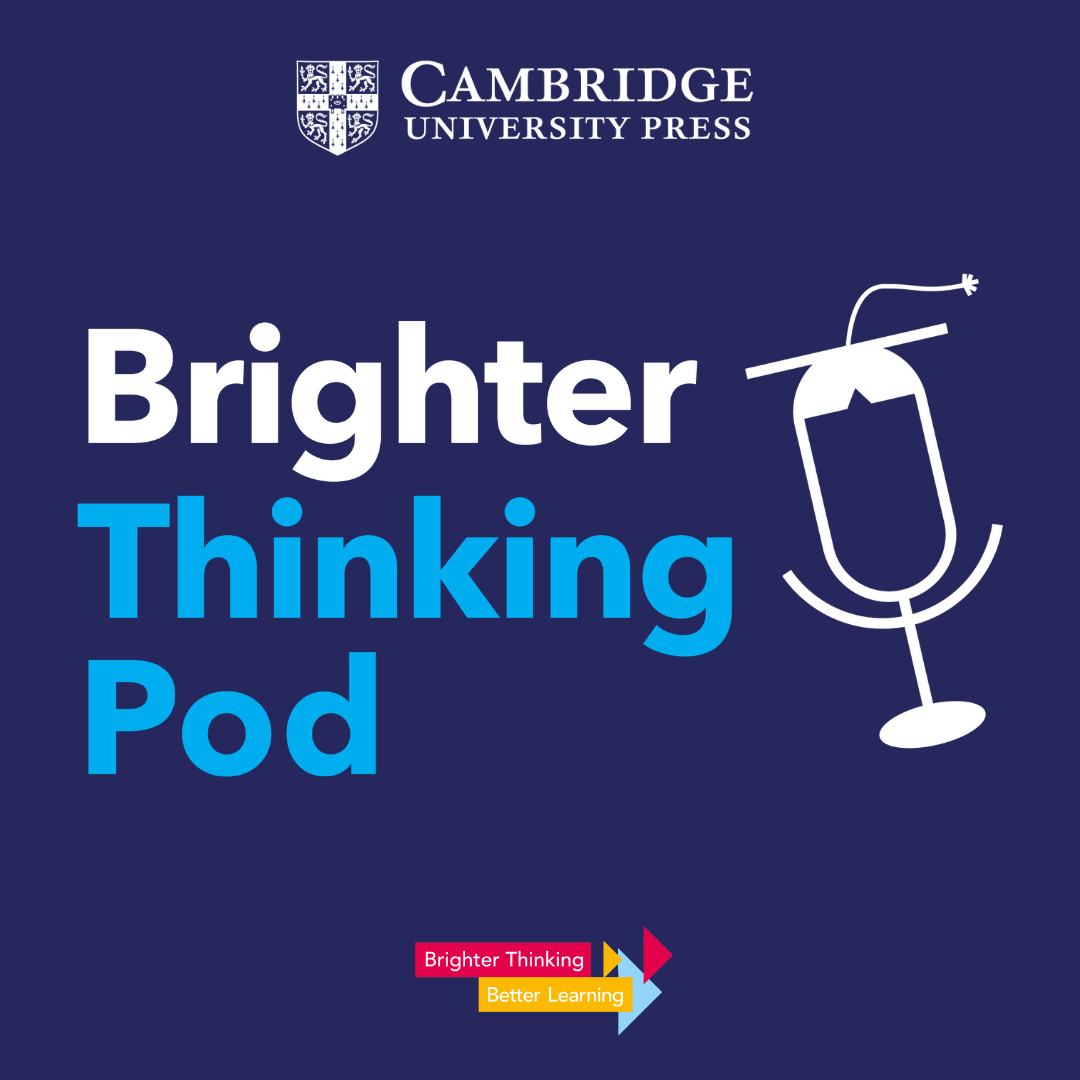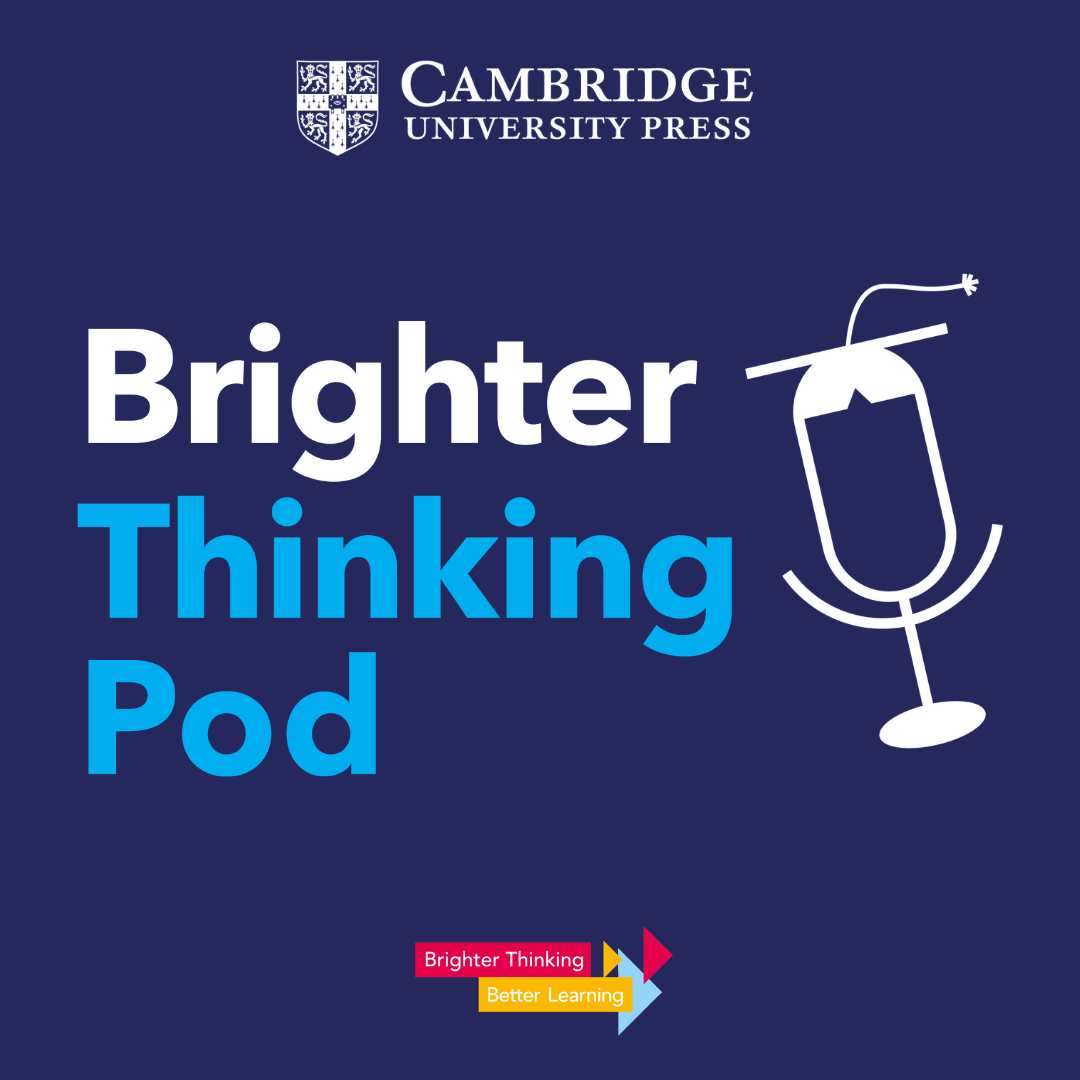Discover Brighter Thinking Pod
Brighter Thinking Pod

Brighter Thinking Pod
Author: Cambridge
Subscribed: 70Played: 701Subscribe
Share
Description
Welcome to the Brighter Thinking Pod from the International Education group of Cambridge University Press & Assessment. We provide a place where international education enthusiasts from all backgrounds can come together to discuss the challenges faced by teachers in a modern classroom and discover new teaching ideas.
Our panels consist of teachers, authors, key subject figures and more. If you'd like to get involved, follow us on Twitter or Instagram @CambridgeInt and send in your show suggestions!
Our panels consist of teachers, authors, key subject figures and more. If you'd like to get involved, follow us on Twitter or Instagram @CambridgeInt and send in your show suggestions!
49 Episodes
Reverse
Welcome back to the Brighter Thinking Pod from Cambridge. In today's episode, we're starting to think about climate change education, moreover, what is education's role in tackling the climate crisis? Our host for this episode is Head of Thought Leadership at Cambridge, Paul Ellis. He is joined by special guest, Chrsitine Özden. Christine is the Global Director for Climate Education at Cambridge University Press & Assessment, and is focused on the climate-related contexts, challenges and opportunities for all of us within the world of education. Show notes: Cambridge Introduction to Climate Change paper - https://www.cambridgeinternational.org/why-choose-us/benefits-of-a-cambridge-education/climate-change-education/ Climate change education survey - https://cambridge.welcomesyourfeedback.net/s/tmmmin Cambridge X (Twitter) - https://twitter.com/CambridgeInt Cambridge Instagram - https://www.instagram.com/cambridgeint/ Full podcast transcript on Brighter Thinking Blog - https://www.cambridge.org/education/blog/brighter-thinking-pod-ep-43-introduction-to-climate-change-education
In this episode, we discuss a topic that is never far from teachers' lips: technology! From ChatGPT to Wolfram Alpha, we look at how teachers are still the most valuable asset a student has, even in this world of rapidly-advancing technology. Our host for this episode is Commissioning Editor for our maths titles at the Press, Arifah Khan. She is joined by two special guests, Karen Morrison and Nick Hamshaw. Karen is an experienced teacher and teacher-trainer who now works as an author and materials developer. She is the author of a number of mathematics courses. Nick is a maths teacher, senior leader and author of our Cambridge IGCSE™ Mathematics Core & Extended coursebook. For all the show notes, plus extra info, go to cambridge.org/education/blog/brighter-thinking-pod-ep-42-how-to-be-an-effective-maths-teacher-in-a-fast-changing-modern-world
This is a special five part mini-series where we are focusing on how best to eat healthily throughout our lives and encourage other people to do the same. In this fifth and final episode, we discuss what students can learn from elite athletes when preparing for their examinations. Your host for this episode is Paul Ellis – Head of Teaching and Learning Strategy at Cambridge Assessment International Education. Our other regular co-host in this series, Dr Chris McLeod, turns guest for this episode. Chris is an academic at Loughborough University, UK, with an expertise in behavioural nutrition and public health. His research aims to improve people’s nutrition, and particularly the nutrition of vulnerable populations by implementing psychological interventions in the public health space. Find all show notes and extra information at cambridge.org/education/blog/brighter-thinking-pod-nutrition.
This is a special five part mini-series where we are focusing on how best to eat healthily throughout our lives and encourage other people to do the same. In this fourth episode, we discuss healthy eating for minoritized ethnic communities. Your hosts are Paul Ellis – Head of Teaching and Learning Strategy at Cambridge Assessment International Education – and Dr Chris McLeod – an academic at Loughborough University, UK, with an expertise in behavioural nutrition and public health. Our special guest for this episode is Dr Hibbah Osei-Kwasi – Lecturer in the school of sport, exercise and health sciences at Loughborough University. Hibbah's research focuses on dietary practices and behavioural change interventions for black, minority ethnic groups. Find all show notes and extra information at cambridge.org/education/blog/brighter-thinking-pod-nutrition.
This is a special five part mini-series where we are focusing on how best to eat healthily throughout our lives and encourage other people to do the same. In this third episode, we continue up the ages and look at how best to educate adults when it comes to healthy eating. Your hosts are Paul Ellis - Head of Teaching and Learning Strategy at Cambridge Assessment International Education - and Dr Chris McLeod - an academic at Loughborough University, UK, with an expertise in behavioural nutrition and public health. Our special guest for this episode is Dr Lucy Porter – a Postdoctural Researcher who is interested in why we eat the things we do and how we can use psychology to make healthy eating easy and enjoyable. Find all show notes and extra information at cambridge.org/education/blog/brighter-thinking-pod-nutrition.
This is a special five part mini-series where we are focusing on how best to eat healthily throughout our lives and encourage other people to do the same. In this second episode, we look at understanding how adolescents could eat more healthily. Your hosts are Paul Ellis - Head of Teaching and Learning Strategy at Cambridge Assessment International Education - and Dr Chris McLeod - an academic at Loughborough University, UK, with an expertise in behavioural nutrition and public health. Our special guest for this episode is Lecturer in Psychology at Loughborough University, Dr Hannah White. Find all show notes and extra information at cambridge.org/education/blog/brighter-thinking-pod-nutrition.
This is a special five part mini-series where we are focusing on how best to eat healthily throughout our lives and encourage other people to do the same. In this first episode, we look at how to educate young children and caregivers about healthy eating. Your hosts are Paul Ellis - Head of Teaching and Learning Strategy at Cambridge Assessment International Education - and Dr Chris McLeod - an academic at Loughborough University, UK, with an expertise in behavioural nutrition and public health. Our special guest for this episode is Professor of Psychology and Public Health in the school of sport, exercise and health science at Loughborough University, Professor Emma Haycraft. Find all show notes and extra information at cambridge.org/education/blog/brighter-thinking-pod-nutrition.
In this episode, we look at mental fluency in maths and how teachers can support their students when preparing for non-calculator questions. Our host for this episode is Commissioning Editor for our maths titles at the Press, Arifah Khan. She is joined by two practising teachers, Jasmine Teo and Nick Asker. Jasmine graduated with a Master of Science, specialising in Mathematics for Educators. She has over two decades of teaching experience, both in public as well as international schools in Singapore. A creative teacher, she likes to experiment with digital tools and inquiry in her teaching. Nick is an independent Mathematics Advisor. He started teaching mathematics in 1982 and has taught in a variety of settings including secondary schools and all-age special schools. Nick regularly leads workgroups for the National Centre for the Excellence in Teaching of Mathematics, and is a tutor on their PD lead programme. Nick has also led teacher education programmes in Africa and the Middle East. Show notes: National Centre for the Excellence in Teaching of Mathematics Relational Understanding and Instrumental Understanding – Richard Skemp Jasmine's gradient and tangent example Carol Dweck – Developing a Growth Mindset Desmos GeoGebra Cambridge IGCSE International Mathematics Cambridge IGCSE and O Level Additional Mathematics
In this episode, we are discussing project work in maths lessons. What are the benefits? How can you facilitate a successful project-based lesson in maths and what kinds of skills do projects teach? Our host today is Arifah Khan, Commissioning Editor for our Mathematics titles. She is joined by two special guests with ties to NRICH. NRICH is an innovative collaboration between the Faculties of Mathematics and Education at the University of Cambridge which focuses on problem solving and on creating opportunities for students to learn mathematics through exploration and discussion. Alison Kiddle is a freelance mathematics education consultant, having previously worked for NRICH as Key Stage 4 coordinator. Charlie Gilderdale is the Secondary Coordinator at NRICH. Show notes NRICH Cambridge IGCSE Mathematics Core and Extended Cambridge IGCSE and O Level Additional Mathematics 'Sowing the seeds for a more creative society' by Professor Mitchel Resnick, Director of the Lifelong Kindergarten research group at the MIT Media Lab Lifelong Kindergarten: Cultivating Creativity through Projects, Passion, Peers, and Play, Mitchel Resnick Growth Mindset, Carol Dwek The role of the teacher in mathematical project work: how to support students, blog by Alison Kiddle Why is it important for students to undertake project work in mathematics? Blog by Charlie Gilderdale
Are you looking for some top tips for helping students to build their skills in the Global Perspectives classroom? Then this episode is for you! Our host for this episode is Commissioning Editor for Global Perspectives and Commerce at the Press, Julia Fusi. She is joined by two special guests. Nancy Budler is a teacher at Brighouse High School in Calderdale, UK. She is also a teacher trainer and one of the authors from our upcoming Lower Secondary Global Perspectives series. Claire Payne is a teacher trainer and tutor at international online school, Wolsey Hall. Show notes Cambridge Primary Global Perspectives resources Cambridge Lower Secondary Global Perspectives resources Cambridge Panel What is a Global Perspectives Challenge? Sample Primary Challenges Sample Lower Secondary Challenges
We're back for part 2 of Stretch, Support and Challenge in Upper Secondary Science. In this episode, we look at challenging your students who want to take sciences beyond school, as well as the kinds of transferable skills sciences teach for those students who want to take a different path. Our host again is Senior Product Marketing Executive at the Press, Tamsin Hart. She is rejoined by Head of Science, David Martindill. David authors titles from our IGCSE biology and combined and co-ordinated sciences series. We also welcome back Chemistry Teacher, Dr. Steve Owen, author from our IB biology and chemistry series. Show notes Cambridge IGCSE Combined and Co-ordinated Science Biology for the IB Diploma Chemistry for the IB Diploma SMOsNotes - IB Chemistry and IGCSE Chemistry worksheets by Dr Steve Owen Cambridge University Press Twitter Cambridge University Press Instagram Email us at educationmarketing@cambridge.org
Are you a secondary science teacher looking for tips on stretching, supporting and challenging your students? This episode is for you! Today's host is Senior Product Marketing Executive at the Press, Tamsin Hart. She is joined by Head of Science, David Martindill. David authors titles from our IGCSE biology and combined and co-ordinated sciences series. We also welcome Chemistry Teacher, Dr. Steve Owen, author from our IB biology and chemistry series. Show notes Cambridge IGCSE Combined and Co-ordinated Science Biology for the IB Diploma Chemistry for the IB Diploma Brighter Thinking Pod Ep 27: Improving Maths Skills in the Science Classroom with ASE SMOsNotes - IB Chemistry and IGCSE Chemistry worksheets by Dr Steve Owen Cambridge University Press Twitter Cambridge University Press Instagram Email us at educationmarketing@cambridge.org
Welcome back to the Brighter Thinking Pod! In this episode we dive into teaching programming to primary and secondary learners. We believe that learning to code is an important skill for young people in today's world - not just in itself, but with the '21st century skills' that come with it: computational thinking, critical thinking, creativity and much more. Our host for this episode is Commissioning Editor for computing and ICT resources at the Press, Carys Morley. She is joined by Neil Rickus and Dr Jon 'Chip' Chippindall. Neil is a Senior Lecturer in Computing Education at the University of Hertfordshire. He also lectures at UCL, Brunel and for various School-Centred Initial Teacher Trainings. Chip is a Primary School teacher at a UK primary school where he teaches computing and science. He is the Director of BCS Barefoot programme and Lead Computing PGCE at The University of Manchester. Show notes Cambridge Primary and Lower Secondary Computing Barefoot Computing Bee-Bots Daisy the Dinosaur app Hour of Code ScratchJr Sphero Neil Rickus Twitter Dr Jon Chippindall (Chip) Twitter Cambridge University Press Twitter Cambridge University Press Instagram
Welcome to the final part of this 3-part epic on assessment! In part 1 we covered the importance of assessment, how teachers are constantly assessing in the classroom, and the principles of good assessment. In part 2 we looked at how you can set assessments up for success. In this episode, evocatively called ‘Steering a Course in the Sea of Data’, we’ll be digging into types of assessment data and how you can effectively use it. Your host again is Senior Brand Marketing Executive and producer of the pod, Adam Steele. He is joined again by Simon Child, Head of Assessment Training at the Cambridge Assessment Network, and co-course Director for the Postgraduate Advanced Certificate in Educational Studies: Educational Assessment at the University of Cambridge. And Brooke Wyatt, Senior Manager, Assessment Training at the Cambridge Assessment Network. Show notes The What, Why and How of Assessment: A guide for teachers and school leaders, Simon Child and Paul Ellis David Didau blog on flightpaths Dylan Wiliam blog on the secret of effective feedback Cambridge Assessment Network on Twitter - @AssessNetwork Cambridge Assessment Network LinkedIn Sign up to the Cambridge Assessment Network newsletter Cambridge University Press Twitter Cambridge University Press Instagram Email us at educationmarketing@cambridge.org
In this second episode on assessment, we hone in on how to make the most out of assessments and ensure they are achieving what you set out to do. Once again, our host is Senior Brand Marketing Executive from the Press and producer of the Brighter Thinking Pod, Adam Steele. He is re-joined by Simon Child, Head of Assessment Training at the Cambridge Assessment Network, and co-course Director for the Postgraduate Advanced Certificate in Educational Studies: Educational Assessment at the University of Cambridge. And Brooke Wyatt, Senior Manager, Assessment Training at the Cambridge Assessment Network. Show notes The What, Why and How of Assessment: A guide for teachers and school leaders, Simon Child and Paul Ellis High level summary of Dylan Wiliam’s work Embedded Formative Assessment, Dylan Wiliam Cambridge Primary Checkpoint Cambridge Lower Secondary Checkpoint Getting Started with Assessment for Learning guide Cambridge Assessment Network on Twitter - @AssessNetwork Cambridge Assessment Network LinkedIn Sign up to the Cambridge Assessment Network newsletter Cambridge University Press Twitter Cambridge University Press Instagram Email us at educationmarketing@cambridge.org
This is a 3-part episode on everybody's favourite subject: assessment. In this first episode, we discuss the main principles that underpin good quality assessment and the questions you can ask to determine if your assessments have worked. Our host for today is Senior Brand Marketing Executive from the Press and producer of the Brighter Thinking Pod, Adam Steele. He is joined by Simon Child, Head of Assessment Training at the Cambridge Assessment Network, and co-course Director for the Postgraduate Advanced Certificate in Educational Studies: Educational Assessment at the University of Cambridge. And Brooke Wyatt, Senior Manager, Assessment Training at the Cambridge Assessment Network. Show notes The What, Why and How of Assessment: A guide for teachers and school leaders, Simon Child and Paul Ellis High level summary of Dylan Wiliam’s work. Embedded Formative Assessment, Dylan Wiliam Cambridge Assessment Network on Twitter - @AssessNetwork Cambridge Assessment Network LinkedIn Sign up to the Cambridge Assessment Network newsletter Cambridge University Press Twitter Cambridge University Press Instagram
This episode is about managing behaviour by developing students' skills of conflict resolution. We discuss what positive peace is and how you can apply the dimensions of peace-keeping, peace-making and peace-building in schools. Our host this week is Senior Brand Marketer at the Press and Producer of the pod, Adam Steele. He is joined by, Professor Hilary Cremin, Peace Education Research Professor at the University of Cambridge. And Hema Mistry, Education Manager in the Teaching and Learning Division at Cambridge Assessment International Education. Show notes Brighter Thinking Blog Positive Peace in Schools: Tackling Conflict and Creating a Culture of Peace in the Classroom, Hilary Cremin 101 Days to Make a Change, Roy Leighton, Emma Kilbey, Kristina Bill Cambridge Peace and Education Research Group (CPERG) Positive Peace Matrix Cambridge University Press Twitter Cambridge University Press Instagram
What skills do students need to learn in order to flourish in IB sciences? Furthermore, do the courses the teach skills that students need for higher education and the world of work? Your host for this episode is Senior Marketing Executive for science titles at the Press, Tamsin Hart. She is joined by two special guests. Brenda Walpole is an author from our IB Diploma Biology series. Brenda has taught IB for around 25 years at a UK school and she is also a teacher trainer. Andreas Tsokos has taught physics and maths for 32 years and is an author from our IB Diploma Physics series. Show notes Association for Science Education Brighter Thinking Pod Episode 27: Improving Maths Skills in the Science Classroom (with ASE) Biology for Cambridge IGCSE™ Maths Skills Workbook Chemistry for Cambridge IGCSE™ Maths Skills Workbook Physics for Cambridge IGCSE™ Maths Skills Workbook Ronald Reagan Strategic Defense Initiative (SDI) “Star Wars Programme” IB community – My IB Biology for the IB Diploma Chemistry for the IB Diploma Physics for the IB Diploma
How do you promote positive learning behaviours inside, and outside, the classroom? Our host for this episode is Laura Kahwati, Education Manager for Thought Leadership at Cambridge Assessment International Education. She is joined by Dr Simon Ellis, a Freelance Educational Consultant who provides training and consultancy support to schools on behaviour for learning. Prior to this, he was a Senior Lecturer in the Faculty of Education at Canterbury Christ Church University where he taught on the Master's in Education programme and the National Award for Special Educational Needs Coordination course. Show notes: Behaviour for Learning: Promoting Positive Relationships in the Classroom, by Simon Ellis, Janet Tod Conceptual framework - A systematic review of how theories explain learning behaviour in school contexts, Dr Sacha Powell and Professor Janet Tod Cambridge Assessment International Education - Education Brief: Learner Wellbeing Cambridge Assessment International Education - Education Brief: Promoting a Positive School Climate
Welcome back to this two-part episode on neurodiversity. In this second part, we discuss strategies for making schools and societies more inclusive spaces. Our host again for this episode is Head of Teaching & Learning Strategy at Cambridge Assessment International Education, Paul Ellis. He is rejoined by our two special guests. Professor Amanda Kirby is a neurodiversity campaigner, medical doctor, academic, researcher, and entrepreneur. She is the CEO of a fast-expanding tech and health/educational profiling company – Do IT – and chair of the ADHD Foundation in the UK. Lauren Woods is Assessment Accessibility Advisor at Cambridge Assessment International Education. She is a former member of a school leadership team with fourteen years’ school-based experience, and has coordinated provision for and supported students with special educational needs and disabilities. Show notes ‘Top tips for supporting students with special educational needs and disabilities before and during exams’, Lauren Woods and Paul Ellis – Cambridge Assessment International Education blog ADHD Foundation ADHD Foundation, Umbrella Gang Comics Professor Amanda Kirby LinkedIn Professor Amanda Kirby Twitter Lauren Woods LinkedIn Cambridge Assessment International Education, Education Brief – Inclusive Education

















